What You Need
To Know About™
Thyroid
National Cancer Institute
Cancer
U.S. DEPARTMENT OF
HEALTH AND HUMAN SERVICES
National Institutes of Health
National Cancer Institute Services
This is only one of many free booklets for
people with cancer.
You may want more information for yourself,
your family, and your doctor.
NCI offers comprehensive research-based
information for patients and their families,
health professionals, cancer researchers,
advocates, and the public.
Call NCI’s Cancer Information Service
1-800-4-CANCER (1-800-422-6237)
Visit NCI’s website
http://www.cancer.gov
Chat online
LiveHelp, NCI’s instant messaging service
http://www.cancer.gov/livehelp
E-mail
cancergovstaff@mail.nih.gov
Order publications
http://www.cancer.gov/publications
1-800-4-CANCER
Get help with quitting smoking
1-877-44U-QUIT (1-877-448-7848)
Contents
1
About This Booklet
3
The Thyroid
5
Cancer Cells
6
Types of Thyroid Cancer
8 Diagnosis
10 Staging
11 Treatment
15 Surgery
18 Thyroid Hormone Treatment
19 Radioactive Iodine Therapy
22 External Radiation Therapy
24 Chemotherapy
25
Second Opinion
27
Follow-up Care
29
Sources of Support
30
Taking Part in Cancer Research
32
Words to Know
41
National Cancer Institute Publications
About This Booklet
This National Cancer Institute (NCI) booklet is for you—
someone who has just been diagnosed with cancer of the thyroid.
This booklet shows words that may be new to you in bold.
See the Words to Know section to learn what a new word means and how to pronounce it.
In 2012, more than 43,000 women and 13,000 men will be diagnosed with thyroid cancer in the United States. Most will be older than 45.
Learning about medical care for thyroid cancer can help you take an active part in making choices about your care. This booklet tel s about…
■■ Diagnosis and staging
■■ Treatment
■■ Follow-up care
■■ Taking part in research studies
You can read this booklet from front to back. Or you can read only the sections you need right now.
This booklet has lists of questions that you may want to ask your doctor. Many people find it helpful to take a list of questions to a doctor visit. To help remember what your doctor says, you can take notes. You may also want to have a family member or friend go with you when you talk with the doctor—to take notes, ask questions, or just listen.
1
For the latest information about thyroid cancer, please visit NCI’s website at http://www.cancer.gov/cancertopics/
types/thyroid.
Also, NCI’s Cancer Information Service can answer your questions about cancer. We can also send you NCI booklets and fact sheets. Call 1-800-4-CANCER (1-800-422-6237).
Or, chat using LiveHelp, NCI’s instant messaging service, at
http://www.cancer.gov/livehelp.
2
The Thyroid
The thyroid is a gland at the front of your neck beneath your voice box (larynx). A healthy thyroid is a little larger than a quarter. It usual y can’t be felt through the skin.
The thyroid has two parts (lobes). A thin piece of tissue (the isthmus) connects the two lobes.
The thyroid makes hormones:
■■ Thyroid hormone: The thyroid follicular cells make thyroid hormone. This hormone affects heart rate, blood pressure, body temperature, and weight. For example, too much thyroid hormone makes your heart race, and too little makes you feel very tired.
■■ Calcitonin: The C cells in the thyroid make calcitonin.
This hormone plays a small role in keeping a healthy level of calcium in the body.
Four or more tiny parathyroid glands are on the back of the thyroid. These glands make parathyroid hormone. This hormone plays a big role in helping the body maintain a healthy level of calcium.
3
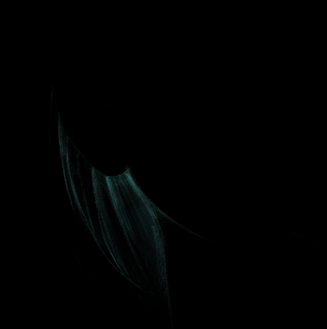
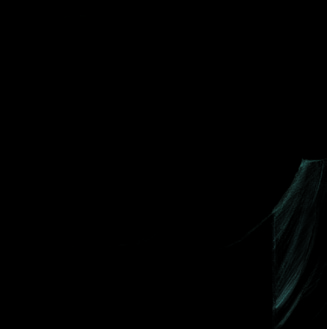

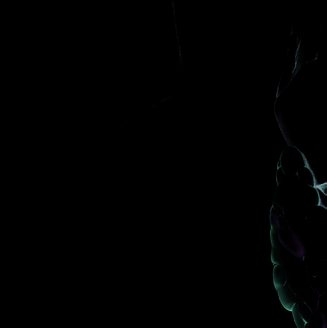
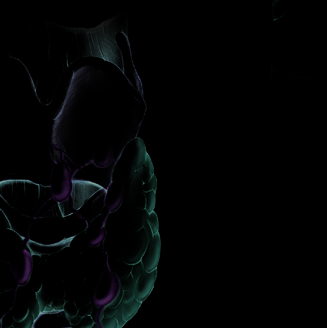

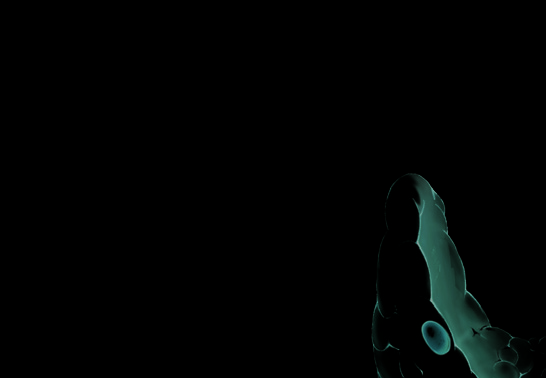
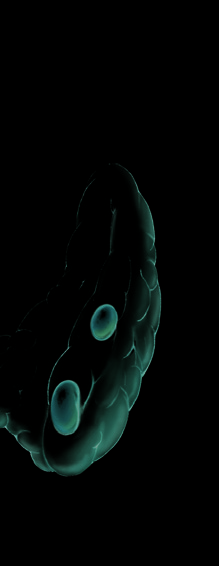
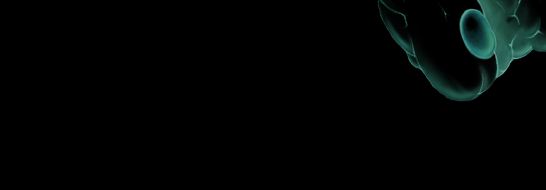
Thyroid
Larynx
Lymph nodes
Isthmus
Lobes
Parathyroid
glands
Isthmus
The pictures show the front and back of the thyroid.
4
Cancer Cells
Cancer begins in cells, the building blocks that make up tissues. Tissues make up the thyroid and other organs of the body.
Normal thyroid cel s grow and divide to form new cel s as the body needs them. When normal cel s grow old or get damaged, they die, and new cel s take their place.
Sometimes, this process goes wrong. New cel s form when the body does not need them, and old or damaged cel s do not die as they should. The buildup of extra cel s often forms a mass of tissue called a nodule. It may also be called a growth or tumor.
Most thyroid nodules are benign. Benign nodules are not cancer (malignant):
■■ Benign nodules:
• Are usual y not harmful
• Don’t invade the tissues around them
• Don’t spread to other parts of the body
• Usual y don’t need to be removed
■■ Malignant nodules (thyroid cancer):
• May sometimes be a threat to life
• Can invade nearby tissues and organs
• Can spread to other parts of the body
• Often can be removed or destroyed, but sometimes thyroid cancer returns
5
Thyroid cancer cel s can spread by breaking away from the thyroid tumor. They can travel through lymph vessels to nearby lymph nodes. They can also spread through blood vessels to the lungs, liver, or bones. After spreading, cancer cel s may attach to other tissues and grow to form new tumors that may damage those tissues.
See the Staging section on page 10 for information about thyroid cancer that has spread.
Types of Thyroid Cancer
There are several types of thyroid cancer:
■■ Papillary: In the United States, papillary thyroid cancer is the most common type. About 86 of every 100 people with thyroid cancer have this type. It begins in follicular cel s and usual y grows slowly. If diagnosed early, most people with papil ary thyroid cancer can be cured.
■■ Follicular: The second most common type is follicular thyroid cancer. A little more than 9 of every 100 people with thyroid cancer have this type. It begins in follicular cel s and usual y grows slowly. If diagnosed early, most people with follicular thyroid cancer can be treated successful y.
■■ Medullary: Medullary thyroid cancer is not common.
About 2 of every 100 people with thyroid cancer have this type. It begins in C cel s and can make abnormal y high levels of calcitonin. Medul ary thyroid cancer tends to grow slowly. It can be easier to control if it’s found and treated before it spreads to other parts of the body.
6
Medullary Thyroid Cancer Sometimes Runs in Families A change in a gene called RET can be passed from parent to child. Nearly everyone with a changed RET gene develops medul ary thyroid cancer. The disease occurs alone, as familial medullary thyroid cancer, or with other cancers, as multiple endocrine neoplasia (MEN) syndrome.
A blood test can usual y detect a changed RET gene. If it’s found in a person with medul ary thyroid cancer, the doctor may suggest that family members also be tested.
For those who have a changed gene, the doctor may recommend frequent lab tests or surgery to remove the thyroid before cancer develops.
■
■
Anaplastic: The least common type is anaplastic thyroid cancer. About 1 of every 100 people with thyroid cancer has this type. Most people with anaplastic thyroid cancer are older than 60. The cancer begins in follicular cel s of the thyroid. The cancer cel s tend to grow and spread very quickly. Anaplastic thyroid cancer is very hard to control.
Tests and treatment options depend on the type of thyroid cancer.
7
Diagnosis
If your doctor thinks that you may have thyroid cancer, you’ll have one or more of the following tests:
■■ Physical exam: Your doctor feels your thyroid for lumps (nodules). Your doctor also checks your neck and nearby lymph nodes for growths or swelling.
■■ Blood tests: Your doctor may check for abnormal levels of thyroid-stimulating hormone (TSH) in the blood.
Too much or too little TSH means the thyroid is not working wel . If your doctor thinks that you may have medul ary thyroid cancer, you’ll be checked for a high level of calcitonin and have other blood tests.
■■ Ultrasound: An ultrasound device uses sound waves that can’t be heard by humans. The sound waves make a pattern of echoes as they bounce off organs inside your neck. The echoes create a picture of your thyroid and nearby tissues. The picture can show thyroid nodules that are too small to be felt. Your doctor uses the picture to learn the size and shape of each nodule and whether the nodules are solid or filled with fluid. Nodules that are filled with fluid are usual y not cancer. Nodules that are solid may be cancer.
■■ Thyroid scan: Your doctor may order a scan of your thyroid. You swallow a small amount of a radioactive substance (such as radioactive iodine), and it travels through the bloodstream. Thyroid cel s that absorb the radioactive substance can be seen on a scan. Nodules that take up more of the substance than the thyroid tissue around them are called “hot” nodules. Hot nodules are usual y not cancer. Nodules that take up less 8
substance than the thyroid tissue around them are called
“cold” nodules. Cold nodules may be cancer.
■
■
Biopsy: A biopsy is the only sure way to diagnose thyroid cancer. A pathologist checks a sample of thyroid tissue for cancer cel s using a microscope.
Your doctor may take tissue for a biopsy in one of two ways:
■
■
With a thin needle: Your doctor removes a sample of tissue from a thyroid nodule with a thin needle. An ultrasound device can help your doctor see where to place the needle. Most people have this type of biopsy.
■
■
With surgery: If a diagnosis can’t be made from tissue removed with a needle, a surgeon removes a lobe or the entire thyroid. For example, if the doctor suspects follicular thyroid cancer, the lobe that contains the nodule may be removed for diagnosis.
You may want to ask the doctor these questions before having a biopsy:
■
■
Will I have to go to the hospital?
■
■
How long will it take? Will I be awake? Will it hurt?
■
■
Are there any risks? What is the chance of infection or bleeding afterward?
■
■
Will I have a scar on my neck?
■
■
How soon will I know the results? Who will explain them to me?
■
■
If I do have cancer, who will talk to me about the next steps? When?
9
Staging
If the biopsy shows that you have cancer, your doctor will need to learn the extent (stage) of the disease to help you choose the best treatment.
The stage is based on the size of the nodule and whether the cancer has invaded nearby tissues or spread to other parts of the body. Thyroid cancer spreads most often to nearby tissues in the neck or to lymph nodes. It may also spread to the lungs and bones.
When cancer spreads from its original place to another part of the body, the new tumor has the same kind of cancer cel s and the same name as the original tumor. For example, if thyroid cancer spreads to the lungs, the cancer cel s in the lungs are actual y thyroid cancer cel s. The disease is metastatic thyroid cancer, not lung cancer. It’s treated as thyroid cancer, not as lung cancer. Doctors sometimes call the new tumor in the lung “distant” disease.
Staging may involve one or more of these tests:
■■ Ultrasound: An ultrasound exam of your neck may show whether cancer has spread to lymph nodes or other tissues near your thyroid.
■■ CT scan: An x-ray machine linked to a computer takes a series of detailed pictures of your neck and chest area. A CT scan may show whether cancer has spread to lymph nodes, other areas in your neck, or your chest.
■■ MRI: MRI uses a powerful magnet linked to a computer.
It makes detailed pictures of your neck and chest area.
MRI may show whether cancer has spread to lymph nodes or other areas.
10
■■ Chest x-ray: An x-ray of the chest can often show whether cancer has spread to the lungs.
■
■
Whole body scan: You may have a whole body scan to see if cancer has spread from the thyroid to other parts of the body. You get a small amount of a radioactive substance (such as radioactive iodine). The substance travels through the bloodstream. Thyroid cancer cel s in other organs or the bones take up the substance. Thyroid cancer that has spread may show up on a whole body scan.
Treatment
Treatment options for people with thyroid cancer are…
■■ Surgery
■■ Thyroid hormone treatment
■■ Radioactive iodine therapy
■■ External radiation therapy
■■ Chemotherapy
You’ll probably receive more than one type of treatment. For example, the usual treatment for papil ary thyroid cancer is surgery, thyroid hormone treatment, and radioactive iodine therapy. External radiation therapy and chemotherapy are not often used for people with papil ary thyroid cancer.
The treatment that’s right for you depends mainly on the type of thyroid cancer (papil ary, follicular, medul ary, or anaplastic). It also depends on the size of the nodule, your age, and whether the cancer has spread. You and your doctor can work together to develop a treatment plan that meets your needs.
11
Your doctor may refer you to a specialist who has experience treating thyroid cancer, or you may ask for a referral. You may have a team of specialists:
■■ Endocrinologist: An endocrinologist is a doctor who specializes in treating people who have hormone disorders.
■■ Thyroidologist: A thyroidologist is an endocrinologist who specializes in treating diseases of the thyroid.
■■ Surgeon: This type of doctor can perform surgery.
■■ Nuclear medicine doctor: A nuclear medicine doctor specializes in using radioactive substances to diagnose and treat cancer and other diseases.
■■ Medical oncologist: A medical oncologist is a doctor who specializes in treating cancer with drugs.
■
■
Radiation oncologist: A radiation oncologist is a doctor who specializes in treating cancer with radiation therapy.
An oncology nurse and a registered dietitian may also be part of your team.
Your health care team can describe your treatment choices, the expected results of each treatment, and the possible side effects. Because cancer treatments often damage healthy cel s and tissues, side effects are common. These side effects depend on many factors, including the type of treatment.
Side effects may not be the same for each person, and they may even change from one treatment session to the next.
Before treatment starts, ask your health care team about possible side effects and how treatment may change your normal activities.
12
At any stage of the disease, supportive care is available to control pain and other symptoms, to relieve the side effects of treatment, and to ease emotional concerns.
You can get information about coping on NCI’s website at
http://www.cancer.gov/cancertopics/coping.
Also, you can get information about supportive care from NCI’s Cancer Information Service at 1-800-4-CANCER
(1-800-422-6237). Or, chat using LiveHelp, NCI’s instant messaging service, at http://www.cancer.gov/livehelp.
You may want to talk with your doctor about taking part in a clinical trial. Clinical trials are research studies testing new treatments. They are an important option for people with all stages of thyroid cancer. See the section on Taking Part in
Cancer Research on page 30.
You and your doctor will develop a treatment plan.
13
You may want to ask the doctor these questions before treatment begins:
■■ What type of thyroid cancer do I have? May I have a copy of the report from the pathologist?
■■ What is the stage of my disease? Has the cancer spread?
If so, where?
■■ What are my treatment choices? Which do you
recommend for me? Will I have more than one kind of treatment?
■■ What are the expected benefits of each kind of treatment?
■■ What are the risks and possible side effects of each treatment? What can we do to control the side effects?
■■ What can I do to prepare for treatment?
■■ Will I have to stay in the hospital? If so, for how long?
■■ What is the treatment likely to cost? Will my insurance cover the cost?
■■ How will treatment affect my normal activities?
■■ What is my chance of a full recovery?
■■ Would a research study (clinical trial) be right for me?
14
Surgery
Most people with thyroid cancer have surgery. The surgeon removes all or part of the thyroid.
You and your surgeon can talk about the types of surgery and which may be right for you:
■■ Removing all of the thyroid: This surgery can be used for all types of thyroid cancer. The surgeon removes the thyroid through an incision in the neck. If some of the thyroid tissue can’t be removed, it can be destroyed later by radioactive iodine therapy. See the Radioactive Iodine
Therapy section on page 19.
The surgeon may also remove nearby lymph nodes. If cancer has invaded tissue within the neck, the surgeon may remove as much of that tissue as possible. If cancer has spread outside the neck, treatment of those areas may involve surgery, radioactive iodine therapy, and external radiation therapy.
■■ Removing a lobe: Some people with follicular or papil ary thyroid cancer may have a small tumor removed from only part of the thyroid. The surgeon will remove one lobe and the isthmus. See page 4 for a picture of the thyroid lobes and isthmus.
Some people who have a lobe removed have a second surgery later on to remove the rest of the thyroid. Less often, the remaining thyroid tissue is destroyed by radioactive iodine therapy.
It’s common to feel tired or weak for a while after surgery for thyroid cancer. The time it takes to heal is different for each person.
15
You may have pain or discomfort for the first few days.
Medicine can help control your pain. Before surgery, you should discuss the plan for pain relief with your health care team. After surgery, they can adjust the plan if you need more pain control.
Surgery for thyroid cancer removes the cel s that make thyroid hormone. After surgery, most people need to take pil s to replace the natural thyroid hormone. You’ll probably need to take thyroid hormone pil s for the rest of your life.
See the Thyroid Hormone Treatment section on page 18.
If the surgeon removes the parathyroid glands, you may need to take calcium and vitamin D pil s for the rest of your life.
In a few people, surgery may damage certain nerves or muscles. If this happens, a person may have voice problems or one shoulder may be lower than the other.
16
You may want to ask the doctor these questions before having surgery:
■■ Which type of surgery do you suggest for me?
■■ Do I need any lymph nodes removed? Will the
parathyroid glands or other tissues be removed? Why?
■■ What are the risks of surgery?
■■ How many surgeries for thyroid cancer have you done?
■■ How will I feel after surgery? If I have pain, how will it be controlled?
■■ How long will I have to be in the hospital?
■■ What will my scar look like?
■■ Will I have any lasting side effects?
■■ Will I need to take thyroid hormone pills? If so, how soon will I start taking them? Will I need to ta












